Waitrose Business Ethics: Stakeholder Analysis and Theories
VerifiedAdded on 2020/02/05
|9
|2481
|29
Report
AI Summary
This report provides a comprehensive analysis of business ethics within the context of Waitrose, a UK-based retail industry. It begins with an introduction to business ethics, emphasizing the importance of ethical practices for organizational success and outlining key ethical issues such as decision-making, compliance, and diversity. The report then delves into a stakeholder analysis, identifying internal stakeholders like employees and managers, and external stakeholders including customers, competitors, suppliers, and the government. Furthermore, the report explores various normative theories such as utilitarianism, egoism, ethics of duty, ethics of rights, and virtue ethics, and how these theories apply to Waitrose's operations and ethical decision-making. The report concludes by highlighting the significance of ethical practices for generating revenue and achieving a competitive advantage, and discusses strategies for resolving ethical dilemmas within the company.
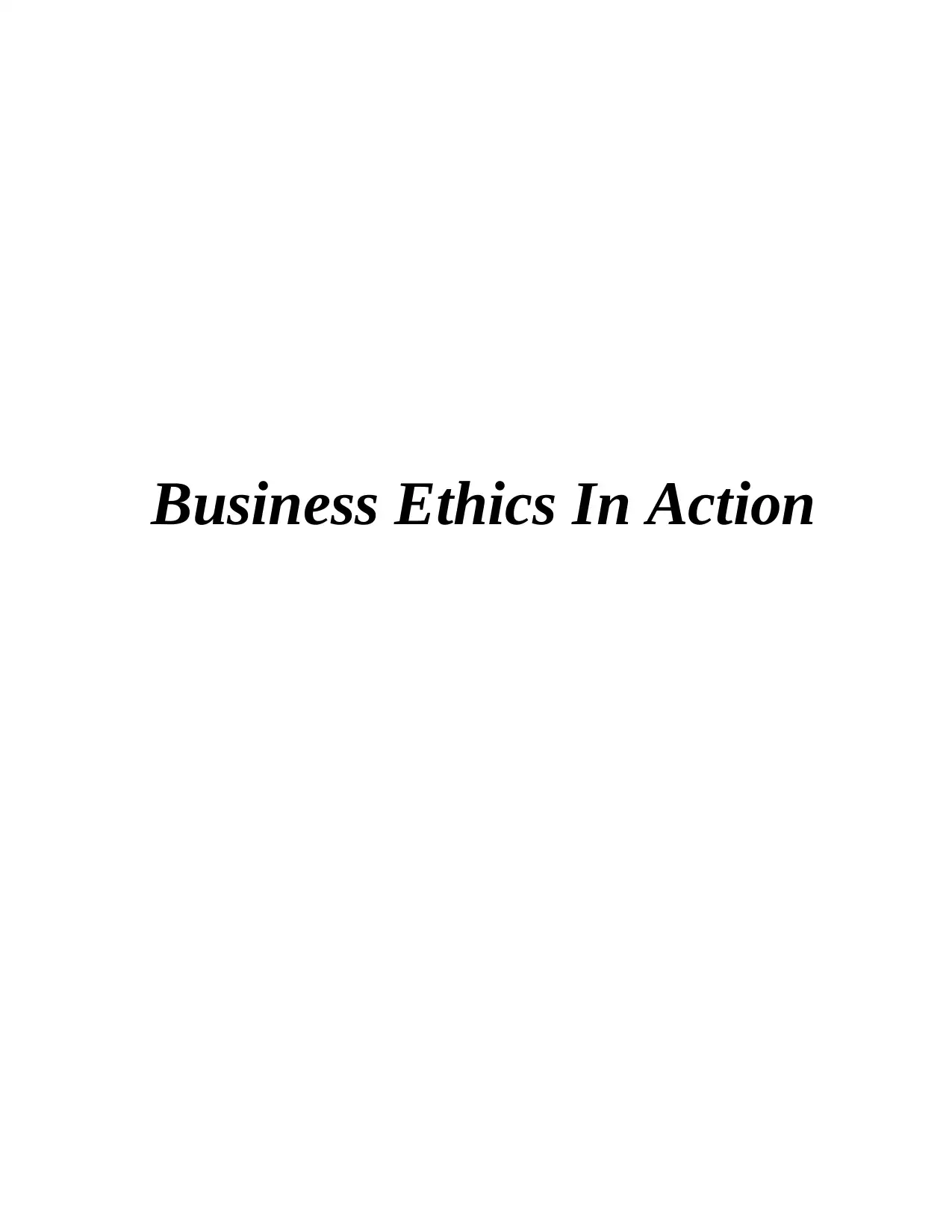
Business Ethics In Action
Paraphrase This Document
Need a fresh take? Get an instant paraphrase of this document with our AI Paraphraser
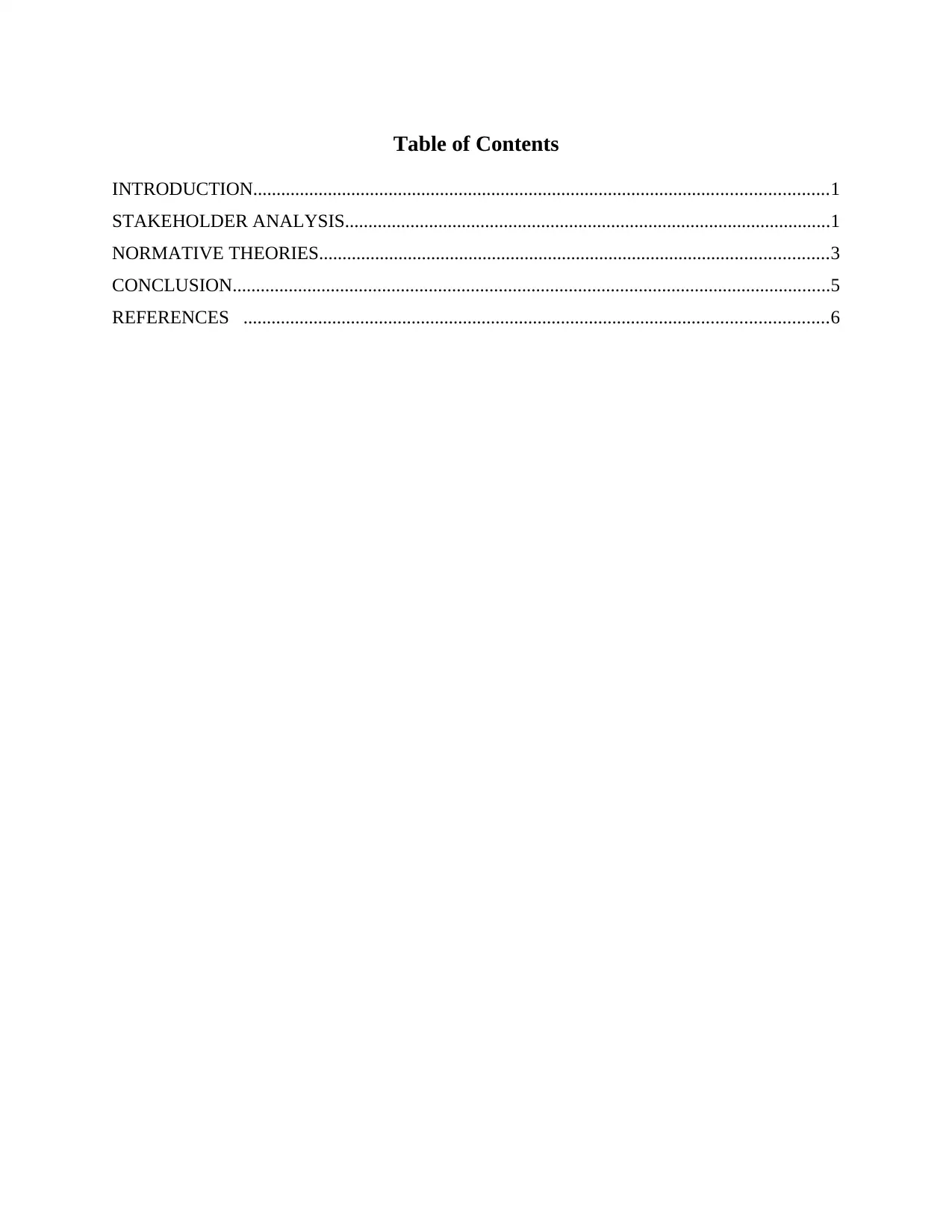
Table of Contents
INTRODUCTION...........................................................................................................................1
STAKEHOLDER ANALYSIS........................................................................................................1
NORMATIVE THEORIES.............................................................................................................3
CONCLUSION................................................................................................................................5
REFERENCES .............................................................................................................................6
INTRODUCTION...........................................................................................................................1
STAKEHOLDER ANALYSIS........................................................................................................1
NORMATIVE THEORIES.............................................................................................................3
CONCLUSION................................................................................................................................5
REFERENCES .............................................................................................................................6
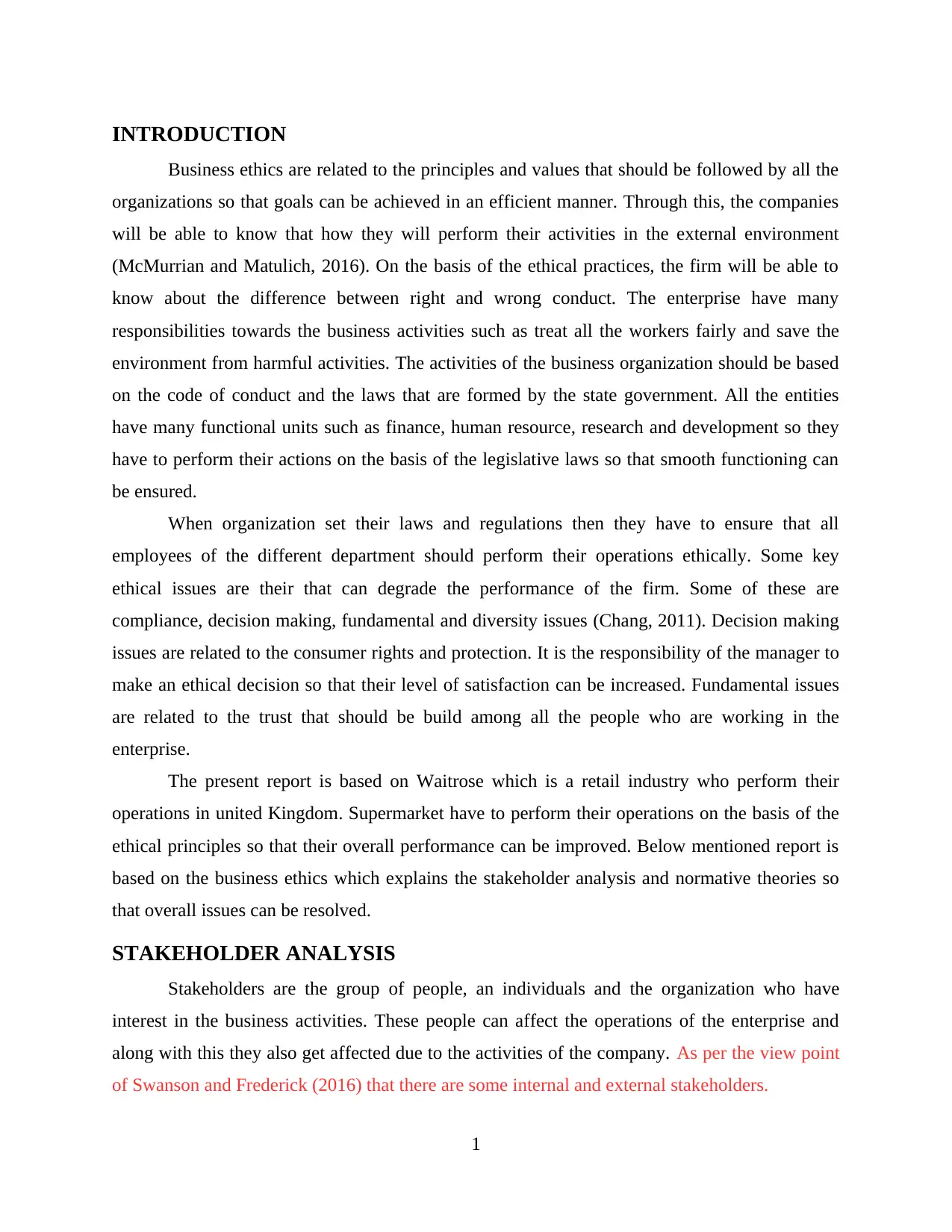
INTRODUCTION
Business ethics are related to the principles and values that should be followed by all the
organizations so that goals can be achieved in an efficient manner. Through this, the companies
will be able to know that how they will perform their activities in the external environment
(McMurrian and Matulich, 2016). On the basis of the ethical practices, the firm will be able to
know about the difference between right and wrong conduct. The enterprise have many
responsibilities towards the business activities such as treat all the workers fairly and save the
environment from harmful activities. The activities of the business organization should be based
on the code of conduct and the laws that are formed by the state government. All the entities
have many functional units such as finance, human resource, research and development so they
have to perform their actions on the basis of the legislative laws so that smooth functioning can
be ensured.
When organization set their laws and regulations then they have to ensure that all
employees of the different department should perform their operations ethically. Some key
ethical issues are their that can degrade the performance of the firm. Some of these are
compliance, decision making, fundamental and diversity issues (Chang, 2011). Decision making
issues are related to the consumer rights and protection. It is the responsibility of the manager to
make an ethical decision so that their level of satisfaction can be increased. Fundamental issues
are related to the trust that should be build among all the people who are working in the
enterprise.
The present report is based on Waitrose which is a retail industry who perform their
operations in united Kingdom. Supermarket have to perform their operations on the basis of the
ethical principles so that their overall performance can be improved. Below mentioned report is
based on the business ethics which explains the stakeholder analysis and normative theories so
that overall issues can be resolved.
STAKEHOLDER ANALYSIS
Stakeholders are the group of people, an individuals and the organization who have
interest in the business activities. These people can affect the operations of the enterprise and
along with this they also get affected due to the activities of the company. As per the view point
of Swanson and Frederick (2016) that there are some internal and external stakeholders.
1
Business ethics are related to the principles and values that should be followed by all the
organizations so that goals can be achieved in an efficient manner. Through this, the companies
will be able to know that how they will perform their activities in the external environment
(McMurrian and Matulich, 2016). On the basis of the ethical practices, the firm will be able to
know about the difference between right and wrong conduct. The enterprise have many
responsibilities towards the business activities such as treat all the workers fairly and save the
environment from harmful activities. The activities of the business organization should be based
on the code of conduct and the laws that are formed by the state government. All the entities
have many functional units such as finance, human resource, research and development so they
have to perform their actions on the basis of the legislative laws so that smooth functioning can
be ensured.
When organization set their laws and regulations then they have to ensure that all
employees of the different department should perform their operations ethically. Some key
ethical issues are their that can degrade the performance of the firm. Some of these are
compliance, decision making, fundamental and diversity issues (Chang, 2011). Decision making
issues are related to the consumer rights and protection. It is the responsibility of the manager to
make an ethical decision so that their level of satisfaction can be increased. Fundamental issues
are related to the trust that should be build among all the people who are working in the
enterprise.
The present report is based on Waitrose which is a retail industry who perform their
operations in united Kingdom. Supermarket have to perform their operations on the basis of the
ethical principles so that their overall performance can be improved. Below mentioned report is
based on the business ethics which explains the stakeholder analysis and normative theories so
that overall issues can be resolved.
STAKEHOLDER ANALYSIS
Stakeholders are the group of people, an individuals and the organization who have
interest in the business activities. These people can affect the operations of the enterprise and
along with this they also get affected due to the activities of the company. As per the view point
of Swanson and Frederick (2016) that there are some internal and external stakeholders.
1
⊘ This is a preview!⊘
Do you want full access?
Subscribe today to unlock all pages.

Trusted by 1+ million students worldwide
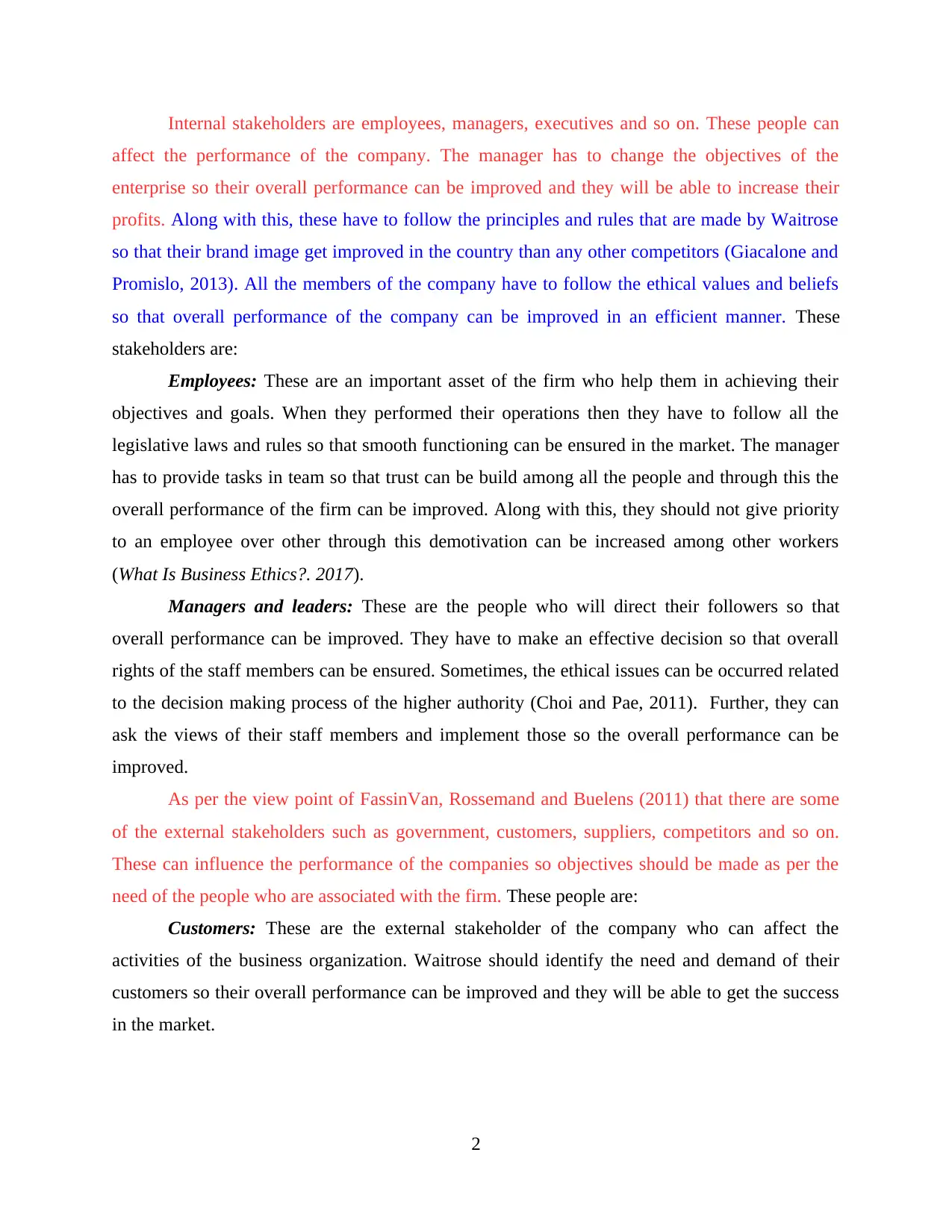
Internal stakeholders are employees, managers, executives and so on. These people can
affect the performance of the company. The manager has to change the objectives of the
enterprise so their overall performance can be improved and they will be able to increase their
profits. Along with this, these have to follow the principles and rules that are made by Waitrose
so that their brand image get improved in the country than any other competitors (Giacalone and
Promislo, 2013). All the members of the company have to follow the ethical values and beliefs
so that overall performance of the company can be improved in an efficient manner. These
stakeholders are:
Employees: These are an important asset of the firm who help them in achieving their
objectives and goals. When they performed their operations then they have to follow all the
legislative laws and rules so that smooth functioning can be ensured in the market. The manager
has to provide tasks in team so that trust can be build among all the people and through this the
overall performance of the firm can be improved. Along with this, they should not give priority
to an employee over other through this demotivation can be increased among other workers
(What Is Business Ethics?. 2017).
Managers and leaders: These are the people who will direct their followers so that
overall performance can be improved. They have to make an effective decision so that overall
rights of the staff members can be ensured. Sometimes, the ethical issues can be occurred related
to the decision making process of the higher authority (Choi and Pae, 2011). Further, they can
ask the views of their staff members and implement those so the overall performance can be
improved.
As per the view point of FassinVan, Rossemand and Buelens (2011) that there are some
of the external stakeholders such as government, customers, suppliers, competitors and so on.
These can influence the performance of the companies so objectives should be made as per the
need of the people who are associated with the firm. These people are:
Customers: These are the external stakeholder of the company who can affect the
activities of the business organization. Waitrose should identify the need and demand of their
customers so their overall performance can be improved and they will be able to get the success
in the market.
2
affect the performance of the company. The manager has to change the objectives of the
enterprise so their overall performance can be improved and they will be able to increase their
profits. Along with this, these have to follow the principles and rules that are made by Waitrose
so that their brand image get improved in the country than any other competitors (Giacalone and
Promislo, 2013). All the members of the company have to follow the ethical values and beliefs
so that overall performance of the company can be improved in an efficient manner. These
stakeholders are:
Employees: These are an important asset of the firm who help them in achieving their
objectives and goals. When they performed their operations then they have to follow all the
legislative laws and rules so that smooth functioning can be ensured in the market. The manager
has to provide tasks in team so that trust can be build among all the people and through this the
overall performance of the firm can be improved. Along with this, they should not give priority
to an employee over other through this demotivation can be increased among other workers
(What Is Business Ethics?. 2017).
Managers and leaders: These are the people who will direct their followers so that
overall performance can be improved. They have to make an effective decision so that overall
rights of the staff members can be ensured. Sometimes, the ethical issues can be occurred related
to the decision making process of the higher authority (Choi and Pae, 2011). Further, they can
ask the views of their staff members and implement those so the overall performance can be
improved.
As per the view point of FassinVan, Rossemand and Buelens (2011) that there are some
of the external stakeholders such as government, customers, suppliers, competitors and so on.
These can influence the performance of the companies so objectives should be made as per the
need of the people who are associated with the firm. These people are:
Customers: These are the external stakeholder of the company who can affect the
activities of the business organization. Waitrose should identify the need and demand of their
customers so their overall performance can be improved and they will be able to get the success
in the market.
2
Paraphrase This Document
Need a fresh take? Get an instant paraphrase of this document with our AI Paraphraser
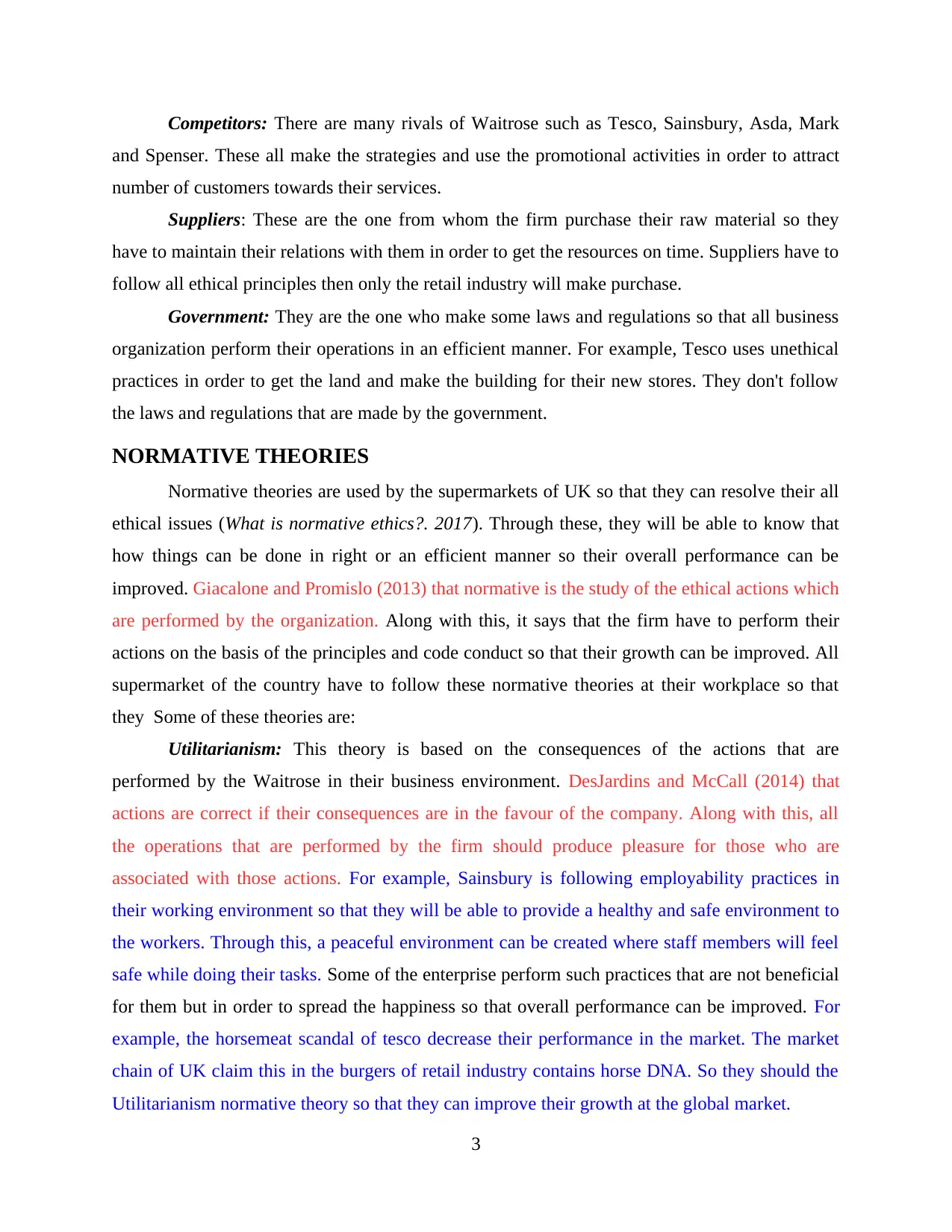
Competitors: There are many rivals of Waitrose such as Tesco, Sainsbury, Asda, Mark
and Spenser. These all make the strategies and use the promotional activities in order to attract
number of customers towards their services.
Suppliers: These are the one from whom the firm purchase their raw material so they
have to maintain their relations with them in order to get the resources on time. Suppliers have to
follow all ethical principles then only the retail industry will make purchase.
Government: They are the one who make some laws and regulations so that all business
organization perform their operations in an efficient manner. For example, Tesco uses unethical
practices in order to get the land and make the building for their new stores. They don't follow
the laws and regulations that are made by the government.
NORMATIVE THEORIES
Normative theories are used by the supermarkets of UK so that they can resolve their all
ethical issues (What is normative ethics?. 2017). Through these, they will be able to know that
how things can be done in right or an efficient manner so their overall performance can be
improved. Giacalone and Promislo (2013) that normative is the study of the ethical actions which
are performed by the organization. Along with this, it says that the firm have to perform their
actions on the basis of the principles and code conduct so that their growth can be improved. All
supermarket of the country have to follow these normative theories at their workplace so that
they Some of these theories are:
Utilitarianism: This theory is based on the consequences of the actions that are
performed by the Waitrose in their business environment. DesJardins and McCall (2014) that
actions are correct if their consequences are in the favour of the company. Along with this, all
the operations that are performed by the firm should produce pleasure for those who are
associated with those actions. For example, Sainsbury is following employability practices in
their working environment so that they will be able to provide a healthy and safe environment to
the workers. Through this, a peaceful environment can be created where staff members will feel
safe while doing their tasks. Some of the enterprise perform such practices that are not beneficial
for them but in order to spread the happiness so that overall performance can be improved. For
example, the horsemeat scandal of tesco decrease their performance in the market. The market
chain of UK claim this in the burgers of retail industry contains horse DNA. So they should the
Utilitarianism normative theory so that they can improve their growth at the global market.
3
and Spenser. These all make the strategies and use the promotional activities in order to attract
number of customers towards their services.
Suppliers: These are the one from whom the firm purchase their raw material so they
have to maintain their relations with them in order to get the resources on time. Suppliers have to
follow all ethical principles then only the retail industry will make purchase.
Government: They are the one who make some laws and regulations so that all business
organization perform their operations in an efficient manner. For example, Tesco uses unethical
practices in order to get the land and make the building for their new stores. They don't follow
the laws and regulations that are made by the government.
NORMATIVE THEORIES
Normative theories are used by the supermarkets of UK so that they can resolve their all
ethical issues (What is normative ethics?. 2017). Through these, they will be able to know that
how things can be done in right or an efficient manner so their overall performance can be
improved. Giacalone and Promislo (2013) that normative is the study of the ethical actions which
are performed by the organization. Along with this, it says that the firm have to perform their
actions on the basis of the principles and code conduct so that their growth can be improved. All
supermarket of the country have to follow these normative theories at their workplace so that
they Some of these theories are:
Utilitarianism: This theory is based on the consequences of the actions that are
performed by the Waitrose in their business environment. DesJardins and McCall (2014) that
actions are correct if their consequences are in the favour of the company. Along with this, all
the operations that are performed by the firm should produce pleasure for those who are
associated with those actions. For example, Sainsbury is following employability practices in
their working environment so that they will be able to provide a healthy and safe environment to
the workers. Through this, a peaceful environment can be created where staff members will feel
safe while doing their tasks. Some of the enterprise perform such practices that are not beneficial
for them but in order to spread the happiness so that overall performance can be improved. For
example, the horsemeat scandal of tesco decrease their performance in the market. The market
chain of UK claim this in the burgers of retail industry contains horse DNA. So they should the
Utilitarianism normative theory so that they can improve their growth at the global market.
3
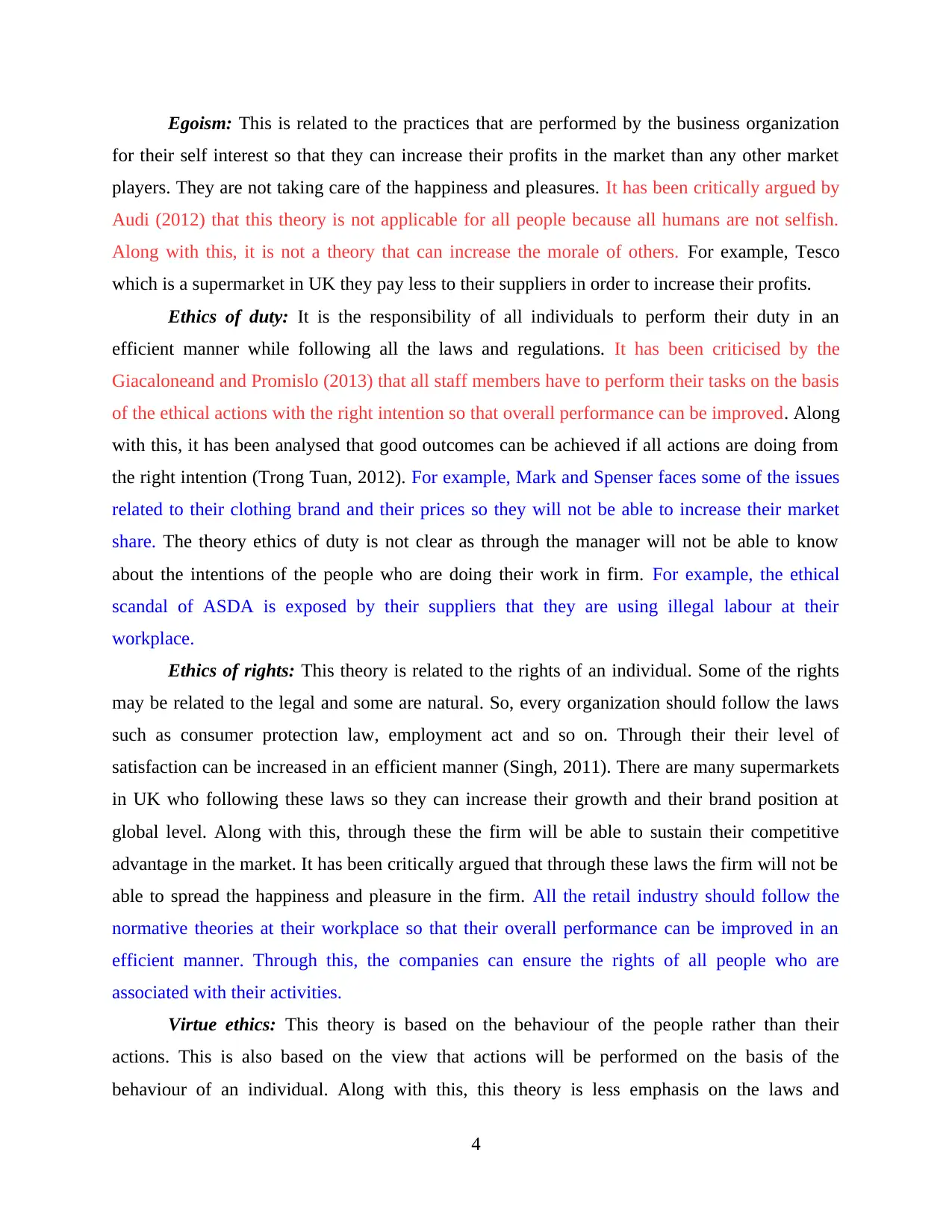
Egoism: This is related to the practices that are performed by the business organization
for their self interest so that they can increase their profits in the market than any other market
players. They are not taking care of the happiness and pleasures. It has been critically argued by
Audi (2012) that this theory is not applicable for all people because all humans are not selfish.
Along with this, it is not a theory that can increase the morale of others. For example, Tesco
which is a supermarket in UK they pay less to their suppliers in order to increase their profits.
Ethics of duty: It is the responsibility of all individuals to perform their duty in an
efficient manner while following all the laws and regulations. It has been criticised by the
Giacaloneand and Promislo (2013) that all staff members have to perform their tasks on the basis
of the ethical actions with the right intention so that overall performance can be improved. Along
with this, it has been analysed that good outcomes can be achieved if all actions are doing from
the right intention (Trong Tuan, 2012). For example, Mark and Spenser faces some of the issues
related to their clothing brand and their prices so they will not be able to increase their market
share. The theory ethics of duty is not clear as through the manager will not be able to know
about the intentions of the people who are doing their work in firm. For example, the ethical
scandal of ASDA is exposed by their suppliers that they are using illegal labour at their
workplace.
Ethics of rights: This theory is related to the rights of an individual. Some of the rights
may be related to the legal and some are natural. So, every organization should follow the laws
such as consumer protection law, employment act and so on. Through their their level of
satisfaction can be increased in an efficient manner (Singh, 2011). There are many supermarkets
in UK who following these laws so they can increase their growth and their brand position at
global level. Along with this, through these the firm will be able to sustain their competitive
advantage in the market. It has been critically argued that through these laws the firm will not be
able to spread the happiness and pleasure in the firm. All the retail industry should follow the
normative theories at their workplace so that their overall performance can be improved in an
efficient manner. Through this, the companies can ensure the rights of all people who are
associated with their activities.
Virtue ethics: This theory is based on the behaviour of the people rather than their
actions. This is also based on the view that actions will be performed on the basis of the
behaviour of an individual. Along with this, this theory is less emphasis on the laws and
4
for their self interest so that they can increase their profits in the market than any other market
players. They are not taking care of the happiness and pleasures. It has been critically argued by
Audi (2012) that this theory is not applicable for all people because all humans are not selfish.
Along with this, it is not a theory that can increase the morale of others. For example, Tesco
which is a supermarket in UK they pay less to their suppliers in order to increase their profits.
Ethics of duty: It is the responsibility of all individuals to perform their duty in an
efficient manner while following all the laws and regulations. It has been criticised by the
Giacaloneand and Promislo (2013) that all staff members have to perform their tasks on the basis
of the ethical actions with the right intention so that overall performance can be improved. Along
with this, it has been analysed that good outcomes can be achieved if all actions are doing from
the right intention (Trong Tuan, 2012). For example, Mark and Spenser faces some of the issues
related to their clothing brand and their prices so they will not be able to increase their market
share. The theory ethics of duty is not clear as through the manager will not be able to know
about the intentions of the people who are doing their work in firm. For example, the ethical
scandal of ASDA is exposed by their suppliers that they are using illegal labour at their
workplace.
Ethics of rights: This theory is related to the rights of an individual. Some of the rights
may be related to the legal and some are natural. So, every organization should follow the laws
such as consumer protection law, employment act and so on. Through their their level of
satisfaction can be increased in an efficient manner (Singh, 2011). There are many supermarkets
in UK who following these laws so they can increase their growth and their brand position at
global level. Along with this, through these the firm will be able to sustain their competitive
advantage in the market. It has been critically argued that through these laws the firm will not be
able to spread the happiness and pleasure in the firm. All the retail industry should follow the
normative theories at their workplace so that their overall performance can be improved in an
efficient manner. Through this, the companies can ensure the rights of all people who are
associated with their activities.
Virtue ethics: This theory is based on the behaviour of the people rather than their
actions. This is also based on the view that actions will be performed on the basis of the
behaviour of an individual. Along with this, this theory is less emphasis on the laws and
4
⊘ This is a preview!⊘
Do you want full access?
Subscribe today to unlock all pages.

Trusted by 1+ million students worldwide
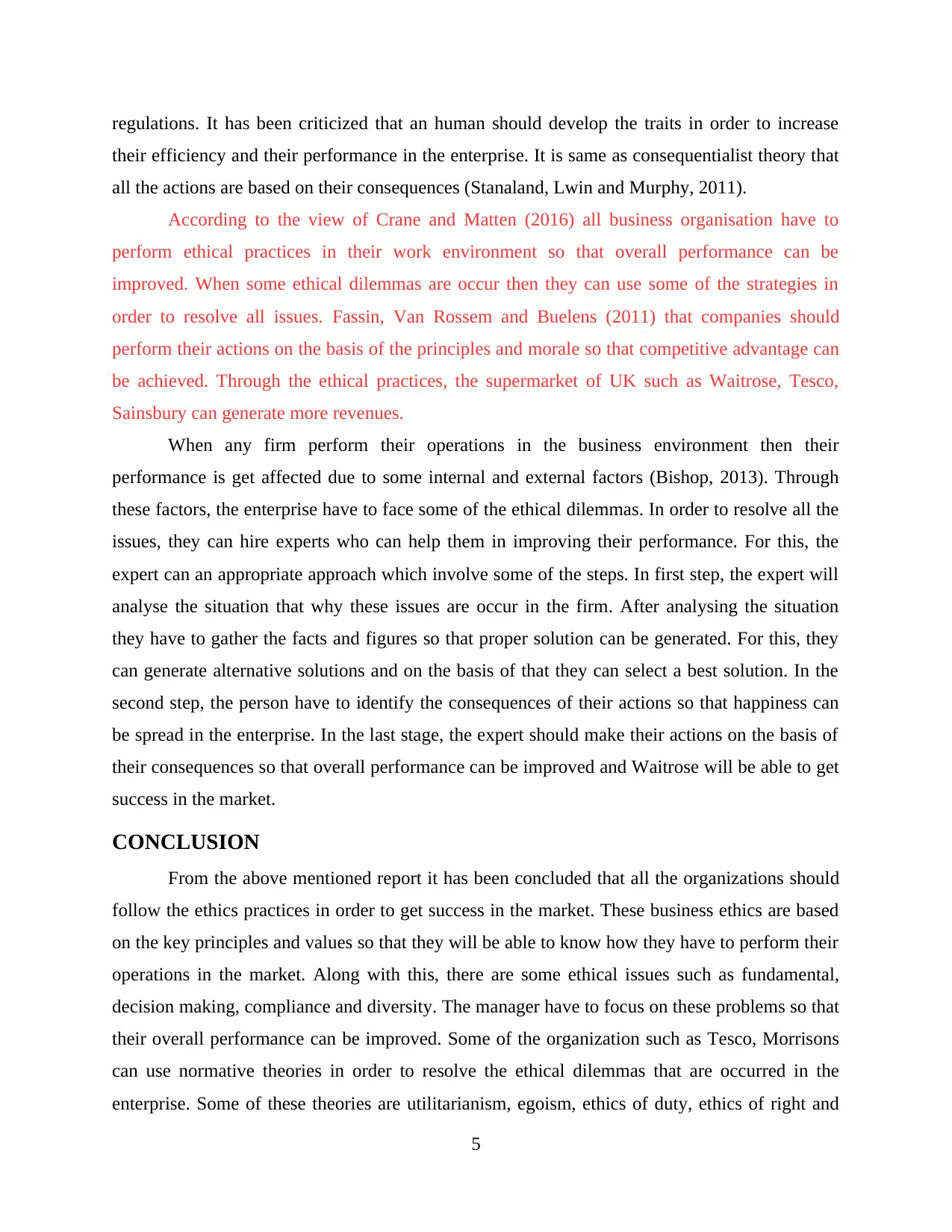
regulations. It has been criticized that an human should develop the traits in order to increase
their efficiency and their performance in the enterprise. It is same as consequentialist theory that
all the actions are based on their consequences (Stanaland, Lwin and Murphy, 2011).
According to the view of Crane and Matten (2016) all business organisation have to
perform ethical practices in their work environment so that overall performance can be
improved. When some ethical dilemmas are occur then they can use some of the strategies in
order to resolve all issues. Fassin, Van Rossem and Buelens (2011) that companies should
perform their actions on the basis of the principles and morale so that competitive advantage can
be achieved. Through the ethical practices, the supermarket of UK such as Waitrose, Tesco,
Sainsbury can generate more revenues.
When any firm perform their operations in the business environment then their
performance is get affected due to some internal and external factors (Bishop, 2013). Through
these factors, the enterprise have to face some of the ethical dilemmas. In order to resolve all the
issues, they can hire experts who can help them in improving their performance. For this, the
expert can an appropriate approach which involve some of the steps. In first step, the expert will
analyse the situation that why these issues are occur in the firm. After analysing the situation
they have to gather the facts and figures so that proper solution can be generated. For this, they
can generate alternative solutions and on the basis of that they can select a best solution. In the
second step, the person have to identify the consequences of their actions so that happiness can
be spread in the enterprise. In the last stage, the expert should make their actions on the basis of
their consequences so that overall performance can be improved and Waitrose will be able to get
success in the market.
CONCLUSION
From the above mentioned report it has been concluded that all the organizations should
follow the ethics practices in order to get success in the market. These business ethics are based
on the key principles and values so that they will be able to know how they have to perform their
operations in the market. Along with this, there are some ethical issues such as fundamental,
decision making, compliance and diversity. The manager have to focus on these problems so that
their overall performance can be improved. Some of the organization such as Tesco, Morrisons
can use normative theories in order to resolve the ethical dilemmas that are occurred in the
enterprise. Some of these theories are utilitarianism, egoism, ethics of duty, ethics of right and
5
their efficiency and their performance in the enterprise. It is same as consequentialist theory that
all the actions are based on their consequences (Stanaland, Lwin and Murphy, 2011).
According to the view of Crane and Matten (2016) all business organisation have to
perform ethical practices in their work environment so that overall performance can be
improved. When some ethical dilemmas are occur then they can use some of the strategies in
order to resolve all issues. Fassin, Van Rossem and Buelens (2011) that companies should
perform their actions on the basis of the principles and morale so that competitive advantage can
be achieved. Through the ethical practices, the supermarket of UK such as Waitrose, Tesco,
Sainsbury can generate more revenues.
When any firm perform their operations in the business environment then their
performance is get affected due to some internal and external factors (Bishop, 2013). Through
these factors, the enterprise have to face some of the ethical dilemmas. In order to resolve all the
issues, they can hire experts who can help them in improving their performance. For this, the
expert can an appropriate approach which involve some of the steps. In first step, the expert will
analyse the situation that why these issues are occur in the firm. After analysing the situation
they have to gather the facts and figures so that proper solution can be generated. For this, they
can generate alternative solutions and on the basis of that they can select a best solution. In the
second step, the person have to identify the consequences of their actions so that happiness can
be spread in the enterprise. In the last stage, the expert should make their actions on the basis of
their consequences so that overall performance can be improved and Waitrose will be able to get
success in the market.
CONCLUSION
From the above mentioned report it has been concluded that all the organizations should
follow the ethics practices in order to get success in the market. These business ethics are based
on the key principles and values so that they will be able to know how they have to perform their
operations in the market. Along with this, there are some ethical issues such as fundamental,
decision making, compliance and diversity. The manager have to focus on these problems so that
their overall performance can be improved. Some of the organization such as Tesco, Morrisons
can use normative theories in order to resolve the ethical dilemmas that are occurred in the
enterprise. Some of these theories are utilitarianism, egoism, ethics of duty, ethics of right and
5
Paraphrase This Document
Need a fresh take? Get an instant paraphrase of this document with our AI Paraphraser
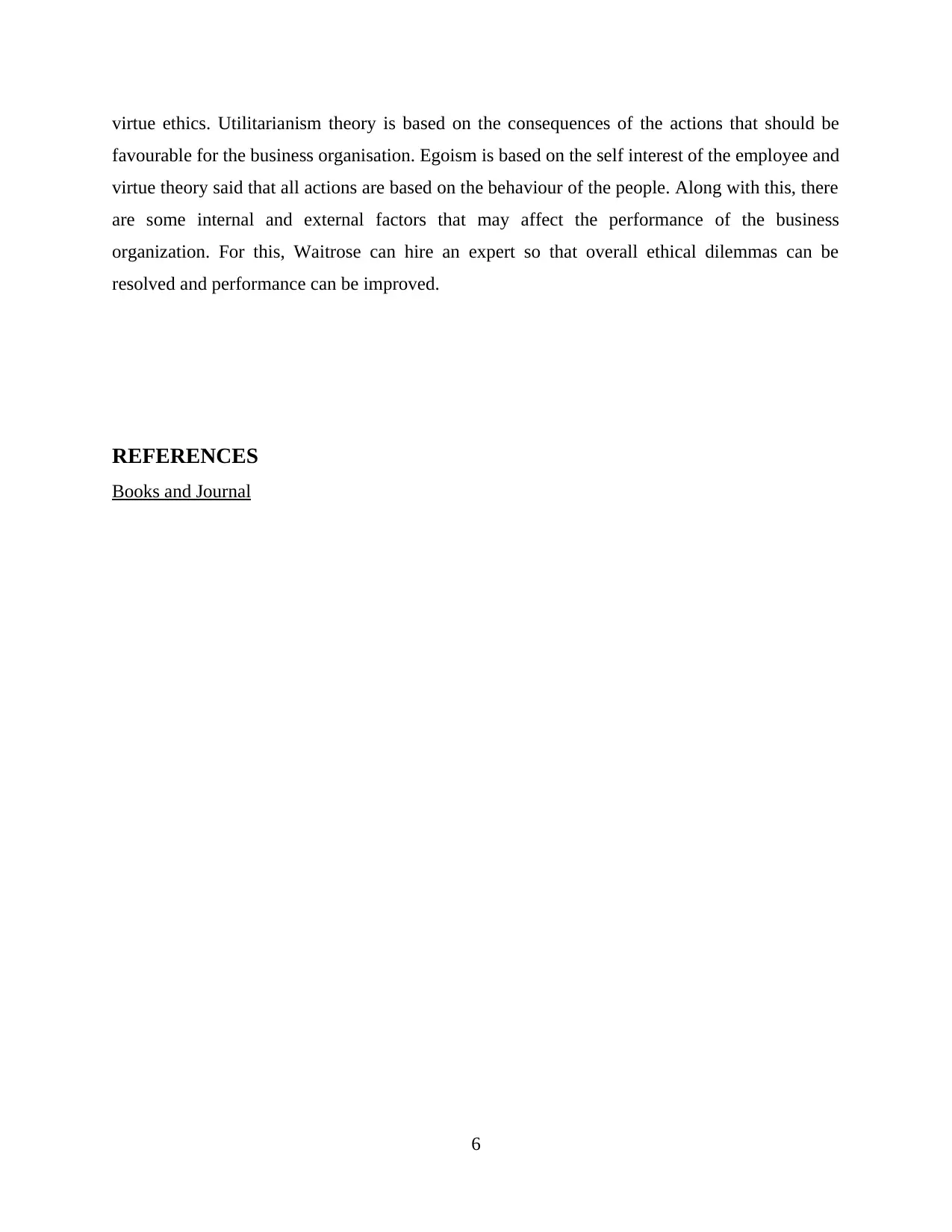
virtue ethics. Utilitarianism theory is based on the consequences of the actions that should be
favourable for the business organisation. Egoism is based on the self interest of the employee and
virtue theory said that all actions are based on the behaviour of the people. Along with this, there
are some internal and external factors that may affect the performance of the business
organization. For this, Waitrose can hire an expert so that overall ethical dilemmas can be
resolved and performance can be improved.
REFERENCES
Books and Journal
6
favourable for the business organisation. Egoism is based on the self interest of the employee and
virtue theory said that all actions are based on the behaviour of the people. Along with this, there
are some internal and external factors that may affect the performance of the business
organization. For this, Waitrose can hire an expert so that overall ethical dilemmas can be
resolved and performance can be improved.
REFERENCES
Books and Journal
6
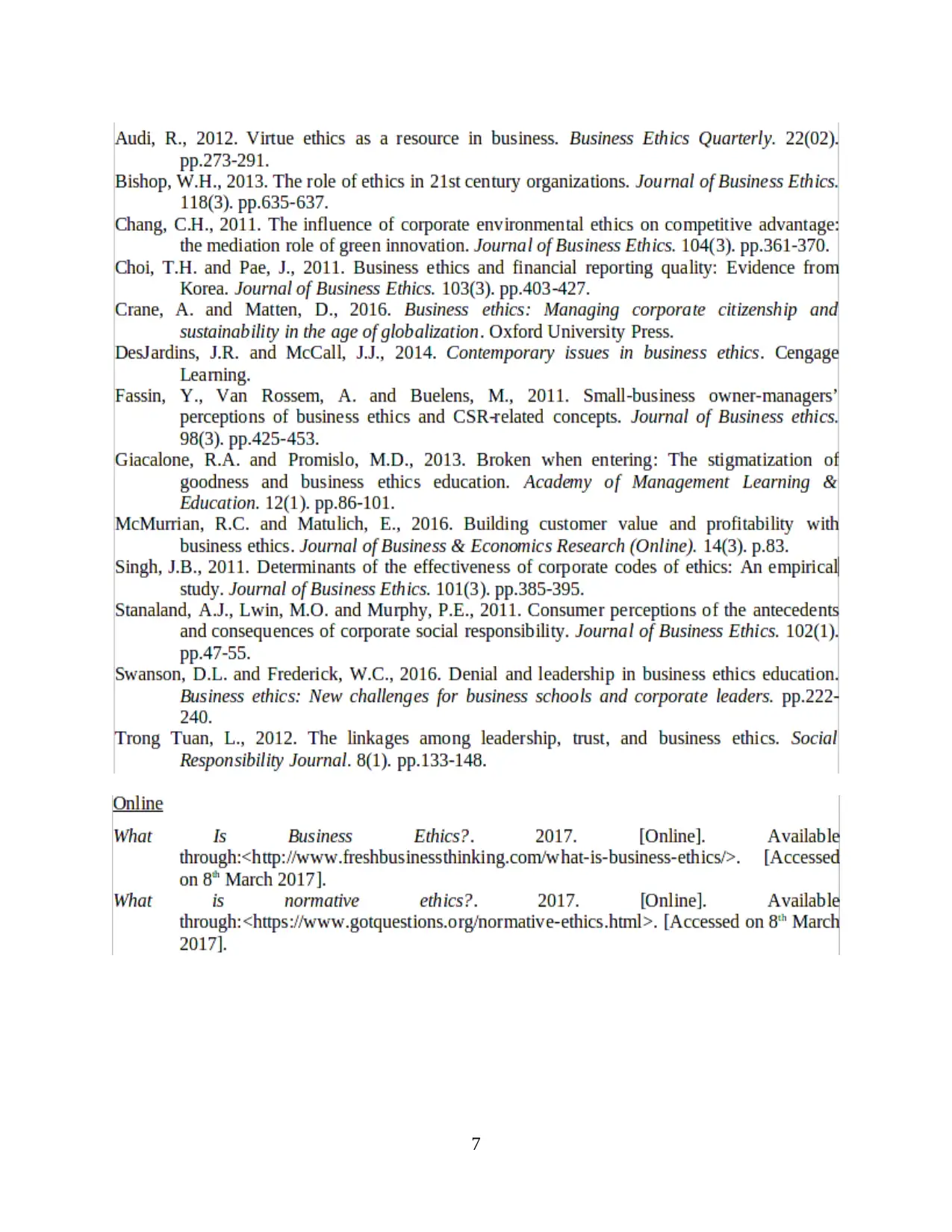
7
⊘ This is a preview!⊘
Do you want full access?
Subscribe today to unlock all pages.

Trusted by 1+ million students worldwide
1 out of 9
Related Documents
Your All-in-One AI-Powered Toolkit for Academic Success.
+13062052269
info@desklib.com
Available 24*7 on WhatsApp / Email
![[object Object]](/_next/static/media/star-bottom.7253800d.svg)
Unlock your academic potential
Copyright © 2020–2026 A2Z Services. All Rights Reserved. Developed and managed by ZUCOL.




